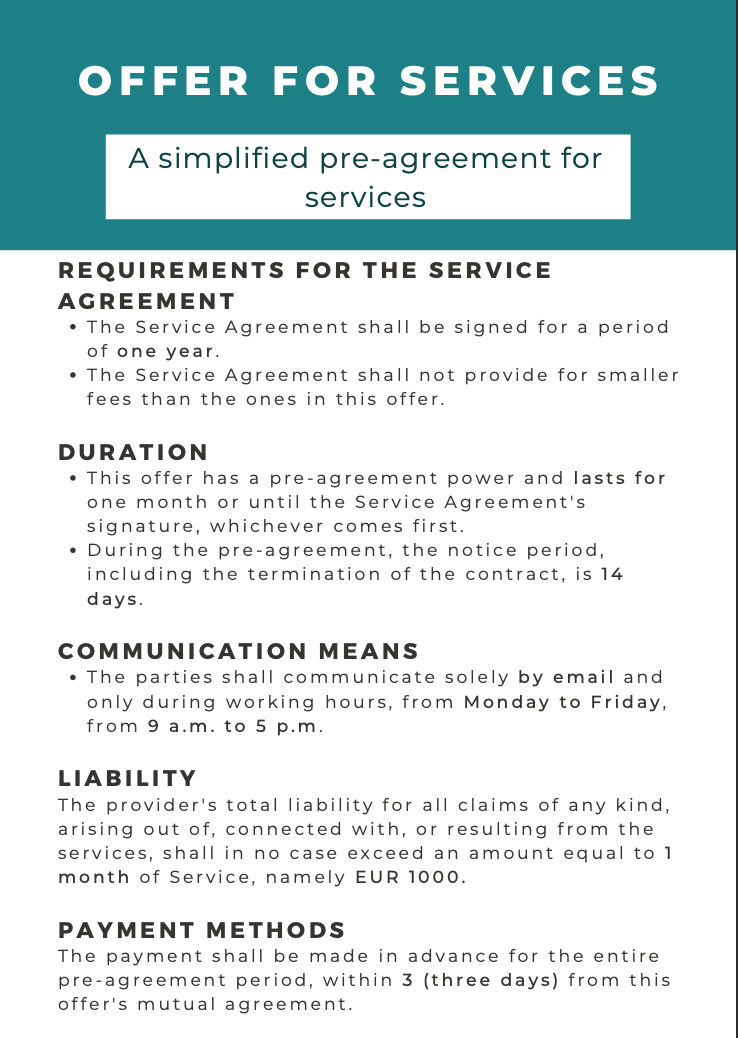Start Producing Protected Revenues Fast with These Two Legal Agreements
How you can ensure to start providing services without delay and in a protected manner with just two agreements at hand
We like to be prepared for uncertainties in almost any situation in our lives. Starting with what we eat in the morning to where we spend our vacations, we want to have our matters in order and planned.
One of the only circumstances where we go after our guts, impressively, is in our businesses. We dive full in without preparing so many things, and we prefer to handle them one at a time as they come. As much as entrepreneurship is about taking risks and having courage, it is not always about blindness but calculations. And so it should be when it comes to your legal requirements and protection.
During your company's time, but especially in the first year, you will have to deal with many professional relationships and partnerships creations. Even if you are a freelancer and plan to do it all by yourself, along the way, you will need help to focus on your clients. In this article, we tell you briefly what agreements you should prepare in advance, so when the opportunity comes, you don't lose it or rush to enter into uncovered partnerships.
About the non-disclosure agreements (also known as confidentiality agreements), we already spoke in another piece of the Avoteca blog, so we’re not going to retake everything we said. But, make sure you go through it, nevertheless.
Service Agreement
The Service Agreement is the central piece in your legal strategy once you have determined where and how you will run your business. The Service Agreement sets out the terms and conditions of you providing services to your clients. There are different ways to draft a Service Agreement, but the most accessible is to have them under generic Terms and Conditions of Business. When your services are specialised - such as digital marketing, content writing, editing, graphic design, infrastructure maintenance, software development and others - you can ask a specialist to help you draft the Terms and Conditions plus an Annexe - Scope of Work. Afterwards, you update your Scope of Work anytime you have a new client.
Of course, the best would be for a lawyer to guide all the time and advise you where more changes will interfere. However, unless you don't change the payment details, responsibilities, limitations of liability, termination, place of service delivery, intellectual property transfers and licences or applicable law, you can just update your Annexe with a new negotiated Scope of Work.
If thoroughly done and drafted as an Offer, the Scope of Work can keep the Agreement's place until you finalise negotiations if the situation requires it. For example, suppose you find a pretty good gig and want to start providing your services right away but don't have a Service Agreement prepared. In that case, you can decide with your client over the Scope of Work. It must be cautiously done, though, to be sure you are still covered as much as possible until you conclude the Agreement.
A Pre-Agreement Offer can include:
-
The specificities of the main agreement. If you have strict conditions that you want the Service Agreement to follow, this is the moment to write them down. The client must know in advance that you have specific requirements from the main Agreement. For example, suppose you want to conclude the Service Agreement for one year only. In that case, you should write it already in the Offer so as everything remains clear and there will not be further discussions and misunderstandings once you reach the negotiations.
-
The duration of the pre-agreement, which should not be longer than one month. The notice of termination for the pre-agreement period, which considering the uncertainty, should be around two weeks.
-
The communication methods: only emails, or also phone calls, or other communication means like WhatsApp or Signal?
-
The payment methods. The best would be to succeed in negotiating an advance payment for two weeks or even the entire month. Like this, you are sure to be covered until the end of the pre-agreement period.
-
A short description of your liabilities and liability limitation, which should not exceed the equivalent amount of your services from the pre-agreement period.
-
A thorough description of your services.
-
The price.
We have prepared a Pre-Agreement Offer template to help you start providing services immediately when meeting a potential client.

Download the pre-agreement offer: PDF
However, we strongly recommend consulting a specialist for the Service Agreement, as many typicalities depend on the type of service and company entity you have created.
Another variant to the Service Agreement is the Intellectual Property Licensing Agreement. It is used very much in creative industries, where sole-entrepreneurs want to keep their copyright, trademark or patent, but give another party the right to use it for a specific time, for free, or in exchange for royalties.
Lawyers from Avoteca have expertise in intellectual property, and they can advise you about the best way to protect your services: through a Service Agreement or Intellectual Property Licensing Agreement.
Collaboration Agreement
It is essential to have a collaboration agreement prepared for different services related to yours that your clients might ask for, but you do not have the expertise or time to provide them. Then, you go to another provider to help with those services. However, you need to set strict rules and make sure they provide, on time, the same quality work as yourself. Ensure that you agreed with your client that subcontractors or other companies might provide part of the services.
At its core, a collaboration agreement is still a Service Agreement, but with stricter rules of delivery and quality of work. The same ideas about the Pre-Agreement Offer can apply to the collaboration agreement also. However, in this situation, it is better to sign a Collaboration Agreement directly because everything your collaborator does will affect you and your business.
The main points to include in a Collaboration Agreement are:
- The scope of collaboration
- The duration of the collaboration
- The price and payment methods
- The work deliverables- when and how it will happen
- The liability in case of breaches and limitation of liability
- Intellectual property rights, transfers and licenses
- A non-disclosure clause
- The protection of personal data of clients that the collaborators exchange or come in contact with
- When and how it will terminate
- What it needs to be done for or after its termination
A collaboration agreement can be concluded between parties either for a long-term relationship or for a specific client and timetable. It is advisable to identify the client and their requirements in the collaboration agreement in the latter case. As your client is not a signatory part of the collaboration, you cannot create responsibilities to the collaborator directly towards your client. However, it is better to describe in detail the purpose of your cooperation.
There is the possibility of drafting and signing a three-party contract between you, your client, and your collaborator. In such situations, the agreement can decide cross-liabilities. Yet, this situation is rare in practice where usually the client desires an end-result and does not want to lose more time with administrative arrangements. This part is usually on you.
Contact an attorney to advise you on the Service Agreement with your client, and they will also help you with the Collaboration Agreement. It is, in fact, better to continue with the same attorney, as they know what you have granted or not in the Service Agreement.
(The template does not represent a legal consultancy and does not give raise to any obligations to anyone)
At Avoteca, we’re building a lawyers community with enthusiastic members that support and nurture independent legal professionals. Join us!
Ana-Maria Drăgănuță Briard
Lawyer & Co-founder of Avoteca | Podcaster at Legal Tale Podcast
30 March 2021
